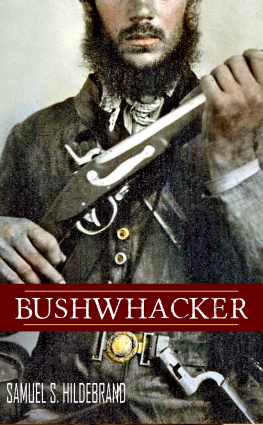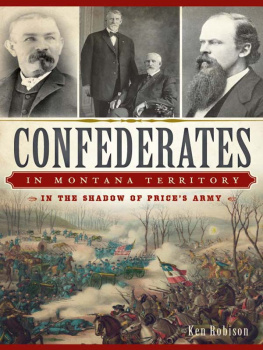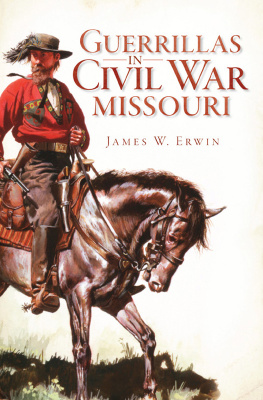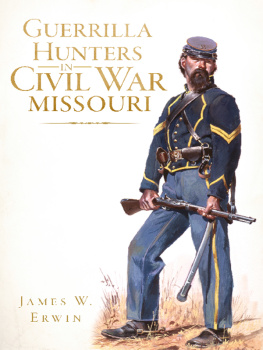
This edition is published by Papamoa Press www.pp-publishing.com
To join our mailing list for new titles or for issues with our books papamoapress@gmail.com
Or on Facebook
Text originally published in 1959 under the same title.
Papamoa Press 2018, all rights reserved. No part of this publication may be reproduced, stored in a retrieval system or transmitted by any means, electrical, mechanical or otherwise without the written permission of the copyright holder.
Publishers Note
Although in most cases we have retained the Authors original spelling and grammar to authentically reproduce the work of the Author and the original intent of such material, some additional notes and clarifications have been added for the modern readers benefit.
We have also made every effort to include all maps and illustrations of the original edition the limitations of formatting do not allow of including larger maps, we will upload as many of these maps as possible.
QUANTRILL AND HIS CIVIL WAR GUERRILLAS
BY
CARL W. BREIHAN
TABLE OF CONTENTS
Contents
TABLE OF CONTENTS
DEDICATION
TO MY CHILDREN
Carol Ann, Carl Jr., and Janis Sue
Oh, the dread of those wild days!
A fearful tale they tell,
When rang the woodlands echoes round
To warlike scream and yell;
When fiercely met the hostile bands
And deadly grew the strife,
And wildly, with the clash of arms,
Went up the shrieks for life.
Acknowledgment
Grassroot research comes under the heading of hard labor, and it would have been nearly impossible to complete this work without the gracious assistance of many friends and old-timers.
Some of these fine old gentlemen have crossed the Great Divide to their just rewards, yet I thank them in the names of those who remain of their families. In this category falls Harry Younger Hall, nephew of Cole Younger, Jesse Edwards James, son of Jesse James, Charles Kemper, that grand old fellow of Independence, Missouri, and Bill Stigers, who resided at St. Joseph, Missouri, and whose mother was named after Quantrill.
I also appreciate the editorial assistance of Glenn Clairmonte and the continued encouragement of Uncle Charlie E. Bell of Louisville, Kentucky, thorough student of the Old West, A. Maxwell of Lexington, Missouri, and Ed Bartholomew, a fellow writer and traveler on old trails.
There are many others who deserve a vote of thanks: the many historical societies, the various state archives, and many writers organizations. And to any and all who have been so kind in the struggle to compile this book I express heartfelt thanks and gratitude.
CARL W. BREIHAN
Illustrations
John Brown
General Jo Shelby
General Jo Shelbys wife
Quantrill at Lawrence, Kansas
Quantrill, 1862
Jesse James, 1863
Jesse James, 1870
Frank James at an early age
Frank James
Frank James, 1898
Fletch Taylor, Frank James, Jesse James, 1866
Captain Bill Anderson
Captain George Todd
Affidavit concerning Cole Younger gun
James Younger
Coleman Younger
Newspaper clipping regarding Mrs. Caroline Quantrill
General James H. Lane
Sam Hildebrand
Colonel Upton S. Hays
Captain John Jerrette
Captain William H. Gregg
Lee McMurtry and William Hulse
Quantrills watch
John Browns Colt
Guns of Jesse James, Frank James, and Cole Younger
Captain Wagners tombstone
Captain George Todds grave
Monument to Quantrill raid victims
Cole Younger gun
Massachusetts Street, Lawrence, 1863
Ruins of Lawrence
Prelude to the Civil War
The Territory of Kansas had not yet been admitted to statehood when John Brown came into prominence there as an abolitionist and agitator. During this era every territory not yet organized into a state became a field of conflict: should it be a state of free citizens, or should the slave system prevail?
John Brown was one of the most colorful and controversial figures of his time: a man of strong convictions, deeply religious, fanatical in his zeal to free the slaves. He led a group of rugged men on raid after raid to punish slaveholders. On the night of May 24, 1856, not long after an outrageous attack by pro-slavery fighters on Lawrence, Kansas, he conducted the massacre of five of his opponents at Pottawatomie Creek.
Ossawatomie, Browns home, was burned in August of that same year by those who hated him, and his son was killed. Sympathizers in Massachusetts, the state of his birth, collected funds to supply him with rifles, and he pondered long on how to use them most effectively. At last he conceived the daring idea of establishing a stronghold in the mountains of Virginia as a refuge for runaway slaves. This secret plan culminated on the night of October 16, 1859, when he led a band of his followers into Harpers Ferry and seized the national arsenal.
That action was at the time said to be a signal for a general insurrection of slaves; but Colonel Robert E. Lee, later commander of the Confederate forces, suppressed the raid, and John Brown was captured. His audacious act proved disastrous to his men, as well, and resulted in further embittering the South. The incident at Harpers Ferry turned out to be a prelude to the Civil War.
Colonel Lee reported:
I have the honor to report for the information of the Secretary of War, that on arriving here on the night of the 17 th , in obedience to Special Orders No. 194 of that date from your office, I learned that a party of insurgents, about 11 P.M. on the 16 th , had seized the watchmen stationed at the armory, the arsenal, the rifle factory, and bridge across the Potomac, and had taken possession of these points. They then dispatched six men under one of their party, called Captain Aaron C. Stevens, to arrest the principal citizens in the neighborhood, and incite the negroes to join in the insurrection. The party took Col. L. W. Washington from his bed about 1:30 A.M., and placed arms in the hands of the negroes. Upon their return here, John E. Cook, one of the party sent to Col. Washingtons wagon, two of his servants, and three of Mr. Allstadts for arms, ammunition, etc.
As day advanced, and the citizens of Harpers Ferry commenced their usual avocations, they were separately captured, to the number of forty, as well as I could learn, and confined in one room of the fire-engine house of the armory, which seems early to have selected same as a point of defense. About 11 A.M. the volunteer companies from Virginia began to arrive, and the Jefferson Guards and volunteers from Charleston under Captain J. W. Rowen, I understand were first on the ground. The Hamtramck Guards, Captain V. M. Butler; the Shepherdstown troops, Captain Jacob Reinhart; and Captain Alburtis company from Martinsburg arrived in the afternoon. These companies, under the direction of Colonels Taylor and Gibson, forced the insurgents to abandon their positions at the bridge and in the village, and to withdraw within the armory enclosure, where they fortified themselves in the fire-engine room and house, and carried ten of their prisoners for the purpose of insuring their own safety and facilitating their escape, whom they termed hostages.









